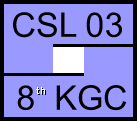
Krishnendu Chatterjee, Thomas A. Henzinger, and Marcin Jurdzinski: Simple stochastic parity games
| Welcome and News |
| Host Institutions |
| Calls and Deadlines |
| Program |
| Social Program |
| Registration |
| Location and Venue |
| Accommodation |
| Committees |
| Contact |
| Colocated Events |
| Authors' instructions |
 Print this page Print this page
|
An efficient translation is given from simple stochastic parity games and parity MDP's to simple parity games. As many algorithms are known for the latter the translation yields efficient algorithms for qualitative solution of simple stochastic parity games and MDP's.
Another main result is a novel subquadratic algorithm for qualitative solution of MDP's with reachability and B\"uchi objectives: it works in time $O(n \sqrt{n})$ compared with $O(n^2)$ for best previously known algorithms. Interestingly, a similar technique sheds light on the important question of the computational complexity of solving simple B\"uchi games yielding the first provably subquadratic algorithm for the problem with running time $O(n^2/ \log n)$.
| © 2002-2003 Kurt Gödel Society, Norbert Preining. |
2003-06-04

|